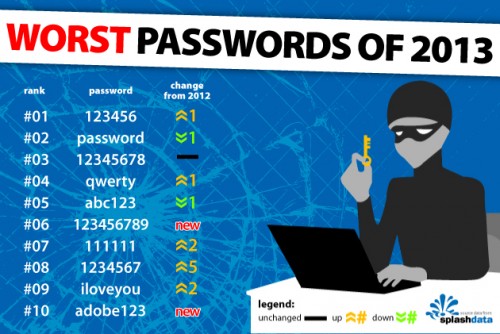If you use 123456 or password as your secure password – it’s time to stop (and change passwords). According to analysis of compromised password lists by Splashid password software these are the 25 worst passwords. Some are obvious – 00000000 anyone? – others are a little more obtuse – monkey?
Presenting SplashData’s “Worst Passwords of 2013” (including Rank and Change from 2012):
1. 123456 (Up 1)
2. password (Down 1)
3. 12345678 (Unchanged)
4. qwerty (Up 1)
5. abc123 (Down 1)
6. 123456789 (New)
7. 111111 (Up 2)
8. 1234567 (Up 5)
9. iloveyou (Up 2)
10. adobe123 (New)
11. 123123 (Up 5)
12. admin (New)
13. 1234567890 (New)
14. letmein (Down 7)
15. photoshop (New)
16. 1234 (New)
17. monkey (Down 11)
18. shadow (Unchanged)
19. sunshine (Down 5)
20. 12345 (New)
21. password1 (Up 4)
22. princess (New)
23. azerty (New)
24. trustno1 (Down 12)
25. 000000 (New)
SplashData’s top 25 list was compiled from files containing millions of stolen passwords posted online during the previous year. The company advises consumers or businesses using any of the passwords on the list to change them immediately.
SplashData suggests making passwords more secure with these tips:
Use passwords of eight characters or more with mixed types of characters. But even passwords with common substitutions like “dr4mat1c” can be vulnerable to attackers’ increasingly sophisticated technology, and random combinations like “j%7K&yPx$” can be difficult to remember. One way to create more secure passwords that are easy to recall is to use passphrases — short words with spaces or other characters separating them. It’s best to use random words rather than common phrases. For example, “cakes years birthday” or “smiles_light_skip?”
Avoid using the same username/password combination for multiple websites. Especially risky is using the same password for entertainment sites that you do for online email, social networking, or financial service sites. Use different passwords for each new website or service you sign up for.
Having trouble remembering all those different strong passwords? Try using a password manager application that organizes and protects passwords and can automatically log you into websites. There are numerous applications available, but choose one with a strong track record of reliability and security like SplashID Safe, which has a 10 year history and over 1 million users. SplashID Safe has versions available for Windows and Mac as well as smartphones and tablet devices.
Via SplashData
